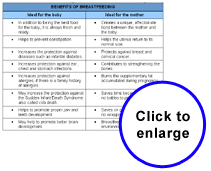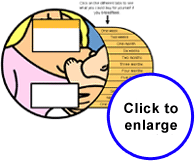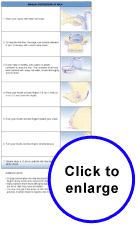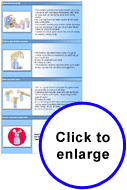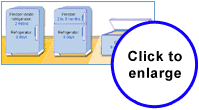A. BREASTFEEDING - NOTHING COMPARES!
Being successful and happy with breastfeeding depends on the confidence you have in your capacity to breastfeed. Even though breastfeeding is "natural", learning to breastfeed is a step by step process for both mom and baby, and can be challenging. The first six weeks are when most learning takes place. Breastfeeding becomes easier with time.

a. Benefits of Breastfeeding
b. Concerns and Myths Surrounding Breastfeeding
New parents have many questions about breastfeeding. Will I be able to breastfeed? Will I have enough milk? Will my partner feel left out?

Test Your Knowledge
|
|
This exercise will help you verify your knowledge about breastfeeding. You will also find answers to some of your questions.
Click on the button that corresponds to the correct answer and check your answer by clicking on the "Check" button.
|
1 |
Most women are able to breastfeed. |
|
2 |
Mothers with small breasts produce less milk than mothers with big breasts. |
|
3 |
Women with flat or inverted nipples cannot breastfeed. |
|
4 |
Breastfeeding causes the breasts to "sag". |
|
5 |
Breastfeeding takes a lot of time. |
|
6 |
A mother who is breastfeeding must watch what she eats. |
|
7 |
Mothers who smoke can breastfeed their babies. |
|
8 |
A woman who is breastfeeding can become pregnant. |
|
9 |
If a woman breastfeeds, her partner is excluded from providing care to the baby. |
|
10 |
It is possible to continue breastfeeding even after returning to work or to school. |
c. Risks of Not Breastfeeding
The benefits of breastfeeding for both the mother and the child are being recognized more and more. Have you ever thought about the risks to you and your baby’s health associated with not breastfeeding? The following list will help you to discover the most common risks mentioned in the literature. Food for thought...
- Increased risk of allergy and asthma
- Reduced cognitive development
- Increased risk of acute respiratory disease
- Increased risk for infection from contaminated formula
- Increased risk of childhood cancers
- Increased risk of obesity and diabetes
- Increased risk of cardiovascular disease
- Increased risk of gastrointestinal and ear infections
- Increased risk of Sudden Infant Death Syndrome*
- Increased risk of breast, ovarian and endometrial cancer for mothers
- Increased risk of osteoporosis and rheumatoid arthritis for mothers
- Increased risk of maternal diabetes
Reference:
INFACT Canada. 14 Risks of Formula Feeding. Retrieved from: http://www.infactcanada.ca/pdf/14-Risks-Small.pdf
INFACT Canada. 2006. Risks of Formula Feeding. Retrieved from: http://www.infactcanada.ca/RisksofFormulaFeeding.pdf
1. Expression of Milk
During the first weeks you may have to express milk if:
- your breasts are too hard for the baby to latch.
- you want to feed your baby with breast milk when you are apart.
- you need to increase your milk production.
This is how to express milk manually.
Most mothers do not need a breast pump. If you do need a breast pump, there are a variety of pumps available for rent or purchase from lactation consultants, hospitals, medical supply outlets, drug stores and some children's stores. Lactation consultants provide instructions and support for the pumps they supply. You can consult a public health nurse at 613-580-6744, a Lactation Consultant, La Leche League, a nurse or midwife about which pump is best for you. The type of pump you select depends on what you intend using it for.
 |
No matter which type of pump you select, you must always follow the instructions that come with the pump. |
Here are a few tips if you are planning on purchasing a breast pump.
